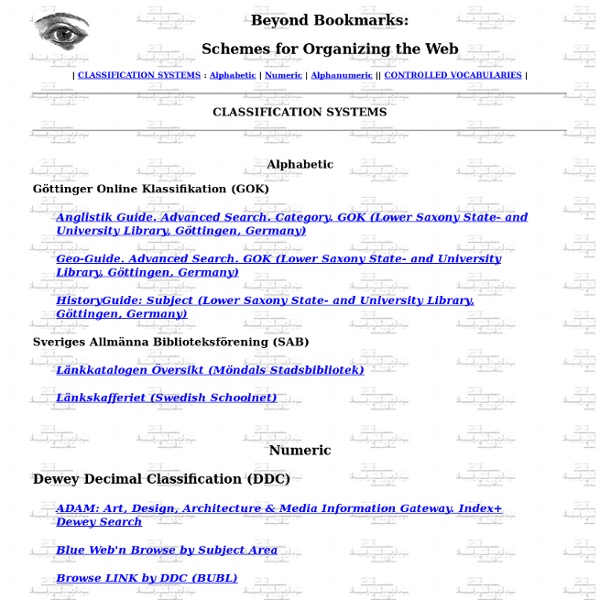



Connaissances & classifications du Monde du Classement Une représentation synthétique des connaissances sous forme de classifications pour assimiler, mémoriser ou communiquer un concept. Actualité Aide Contenu du site Vous pouvez consultez les informations sur ce projet et les liens. Knowledge tags Keyword assigned to information The use of keywords as part of an identification and classification system long predates computers. Paper data storage devices, notably edge-notched cards, that permitted classification and sorting by multiple criteria were already in use prior to the twentieth century, and faceted classification has been used by libraries since the 1930s. Online databases and early websites deployed keyword tags as a way for publishers to help users find content. Within application software [edit] Assigned to computer files There are various systems for applying tags to the files in a computer's file system. Advantages and disadvantages Complex system dynamics
Dewey Browse Article : diff entre Taxonomie, Thésaurus, etc. (This excellent overview was written by Woody Pidcock of the Boeing company and posted at metamodel.com. It has been edited slightly so it could be archived here.) I will answer this question one step at a time. To keep this answer focused on the question, I will use other concepts that I will not define here. A controlled vocabulary is a list of terms that have been enumerated explicitly. If the same term is commonly used to mean different concepts in different contexts, then its name is explicitly qualified to resolve this ambiguity. A taxonomy is a collection of controlled vocabulary terms organized into a hierarchical structure. A thesaurus is a networked collection of controlled vocabulary terms. People use the word ontology to mean different things, e.g. glossaries & data dictionaries, thesauri & taxonomies, schemas & data models, and formal ontologies & inference. People make commitments to use a specific controlled vocabulary or ontology for a domain of interest. Additions ¶
The Accidental Taxonomist: Taxonomy Trends and Future What are the trends in taxonomies, and where is the field going? The future of taxonomies turned out to be a unifying theme of last week’s annual Taxonomy Boot Camp conference, in Washington, DC, the premier event in taxonomies, from its opening keynote to its closing panel. “From Cataloguer to Designer” was the title of the opening keynote, an excellent presentation by consultant Patrick Lambe of Straits Knowledge. He said that there are new opportunities for taxonomists, especially in the technology space, if they change their mindset and their role from that of cataloguers, who describe the world as it is, to that of designers, who plan things as they could be. The spread of greater understanding of taxonomies was a common theme of that panel. Looking to the future, the panelists’ shared predictions included greater use of linked data, taxonomy visualization, and text analytics. New trends and technologies were discussed in individual presentations, too.
TermSciences - Terminologie Scientifique Knowledge retrieval Knowledge Retrieval seeks to return information in a structured form, consistent with human cognitive processes as opposed to simple lists of data items. It draws on a range of fields including epistemology (theory of knowledge), cognitive psychology, cognitive neuroscience, logic and inference, machine learning and knowledge discovery, linguistics, and information technology. Overview[edit] In the field of retrieval systems, established approaches include: Data Retrieval Systems (DRS), such as database management systems, are well suitable for the storage and retrieval of structured data.Information Retrieval Systems (IRS), such as web search engines, are very effective in finding the relevant documents or web pages. Both approaches require a user to read and analyze often long lists of data sets or documents in order to extract meaning. The goal of knowledge retrieval systems is to reduce the burden of those processes by improved search and representation. References[edit]
Descripteurs